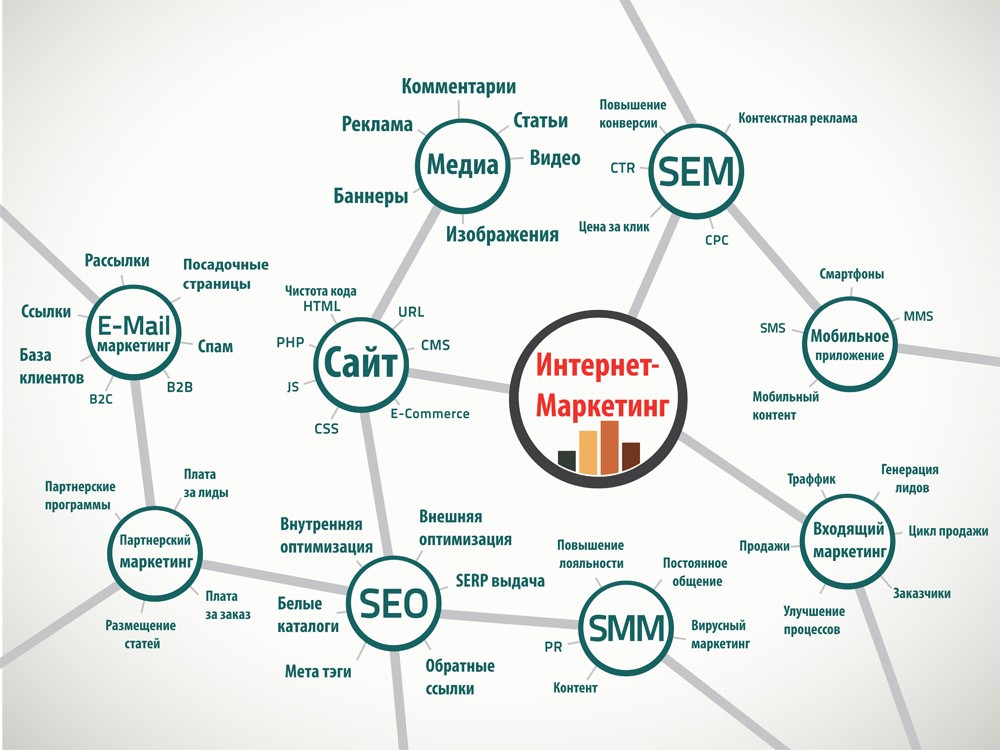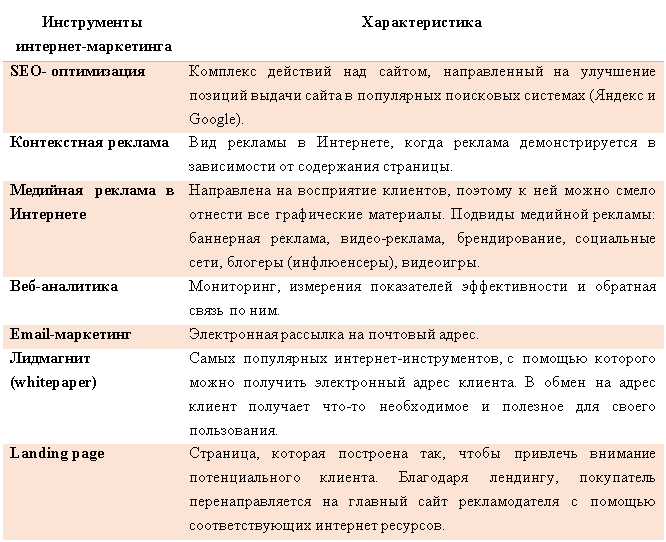Abstract
Attention! This abstract refers to work that has not yet been completed. Approximate completion date: June 2022. Contact the author after the specified date to receive the final version.
Content
- Introduction
- 1. Functions of marketing in the enterprise
- 2. The main tasks of marketing management
- 3. Marketing management concepts
- 3.1 Concept of production improvement
- 3.2 Product Improvement Concept
- 3.3 Concept of intensification of commercial efforts
- 3.4 Concept of intensification of commercial efforts
- 3.5 Marketing concept
- 4. Internet Marketing
- 5. Online Promotion Tools
- Findings
- Sources
Introductio
The role of marketing is that it is designed to bring production in line with demand. The efforts of marketing services are aimed at creating such an assortment of goods that would correspond to public demand. Marketing is aimed at finding the most effective combination of traditional and new products, it is the basis for making a decision to expand or reduce production volumes, modernize products or remove them from production and implement enterprise development plans[1].
Systematic and effective marketing increases the culture of entrepreneurial activity, allows enterprises to effectively link resources with goals, and goals with customer requests. The scope of marketing is very large. And every day each of us faces it. We make purchases, find those goods that best suit us, meet our needs. Going to the exhibition, we will again encounter the manifestation of marketing, but not on a separate stand or box. Marketing will be invisibly present in everything, and the more the more we like the exhibition. Even more marketing in the virtual world. In it, the computer, software, specific sites, games from which you can not tear yourself away - everything is special for you. This is achieved with the help of marketing, its tools and means.
The purpose of the master's thesis is to increase the efficiency of marketing activities of an IT company.
Objectives of the master's thesis:
- Study and analyze the functions of marketing in the enterprise.
- Define the main tasks of marketing management.
- Consider marketing management concepts.
- Define the concept of "Internet marketing" and consider its essence.
- Consider online promotion tools for an IT company.
The object of the study is the tools of Internet marketing and the features of the marketing activities of the IT company.
1. Functions of marketing in the enterprise
The term "marketing" is formed from the English word "market" - the market and implies the activities of the company in market conditions.
Marketing is a diverse, complex phenomenon, including a system of views, coordination of various activities of the company in order to link its production capabilities and market needs for relevant products [2].
Marketing mix is a set of marketing tools that are used by the company to solve marketing problems in the target market, proposed by Jeremy McCarthy (Fig. 1).

Figure 1 Marketing Complex
The basic 4P model consists of the following elements:
- Product / product - functionality, quality, product appearance, packaging and brand. This includes warranties, support and service.
- Price / price - cost, discounts, promotions, bonuses, terms and conditions of payment.
- Promotion / promotion - advertising and PR, direct sales, media and budget.
- Place / place of sale - participants in the distribution chain of goods, market coverage, geography and places of sale, logistics.
The state of demand in marketing is one of the key factors that determines the objectives, strategies and methods of marketing. Below are eleven types of marketing depending on demand:
1. Conversion marketing. Its task is to influence negative demand, that is, to change the situation when buyers do not want to take the goods, even if they have the opportunity. To accomplish this task, marketers sometimes redesign the product, try to market it more effectively, and often lower the price.
2. Promotional marketing. This type of marketing aims to create or increase demand for goods and services. Since this tactic is a response to the indifference and disinterest of consumers, promotional marketing must identify the reasons for this behavior and decide how to overcome this barrier.
3. Developmental marketing. It helps to identify potential, hidden demand for goods and services when many consumers are not satisfied with existing products. The purpose of developmental marketing is to assess the size of the hidden market and create more effective products that can turn demand into real.
4. Remarketing. This type of marketing is used to revive demand when the life cycle of a product or service is fading.
5. Synchromarketing. The task of this type of marketing is to smooth out fluctuations in conditions of unstable demand. This happens in seasonal goods, in the restaurant business or in the transport industry, where the level of demand depends on the time of day. The main methods of synchromarketing are a flexible pricing policy and the active use of sales promotion tools (promotions, discounts).
6. Supportive marketing. This type of marketing is used when the competitive environment is established, the demand for goods and services is stable, and the production capabilities of the company exactly match the level of demand.
7. Counter marketing. Its mission is to reduce demand in excess of supply for products that are harmful to people or the environment, such as alcoholic beverages, tobacco products, high-emission vehicles, non-recyclable plastic products, and more.
8. Demarketing. This type of marketing is aimed at reducing the demand for your product. It is used if demand exceeds supply, and it is not possible to increase production at the moment. You can achieve the desired result by increasing the price, reducing the volume of advertising or reducing the promotional effort. Unlike counter marketing, demarketing is not designed to destroy demand for a product, but only to balance it with production capacity.
9. Personal marketing. Its task is to instill in buyers a certain attitude towards a particular person, and then maintain or correct this behavior. This type of marketing is used in personality brands, show business, politics, etc.
10. Marketing innovation. Responsible for identifying and developing innovative products or services, i.e. products with new properties. The level of novelty of an innovation is one of the important factors in the competitiveness of a product.
11. Network marketing. This is the conduct of retailing by the method of personal sales, bypassing the traditional store trade.
Marketing can be represented [3]:
at the macro, meso and micro levels of management;
when solving strategic and tactical tasks;
in production, commercial and non-commercial activities.
Taking into account the above, marketing is defined as follows:
management function at the beginning of the cycle (market research);
control function at the end of the cycle (sales);
a set of some general management functions (analysis, planning, organization, coordination, control) and specific marketing private functions (market research, development of marketing strategy, product, innovation, sales, advertising and service policies);
a group of methods;
market philosophy of the enterprise, focused on the consumer;
activity function;
positional-activity function.
2. The main tasks of marketing management
Marketing management is considered as a type of activity aimed at solving problems and organizing the systematic, expedient functioning of the company. The management process includes the following stages [3]:
formation of goals;
identification of problems that may arise in the course of achieving the goals;
assessment of the means available to the enterprise to achieve the set goals;
identification of possible options for achieving the goals of the enterprise, their effectiveness and consequences;
selection of the most preferred option;
development of a detailed plan (program) of activities and providing it with financial and other resources;
management of the implementation of the program (issuance of recommendations, instructions, directives);
performance control;
evaluation of the achievement of the set goals;
analysis of the processes occurring in the environment, trends in its changes, and the development of actions to adjust the activities of the enterprise, the creation of feedback.
The main tasks of marketing management in the enterprise are planning, information and communication support, control.
Planning defines the main tasks and criteria for the development of plans, the structure and reserves of plans, establishes the initial data and determines the overall organization of the process.
3. Marketing management concepts
3. Marketing management concepts. There are five main approaches on the basis of which commercial organizations conduct their marketing activities: the concept of improving production, the concept of product improvement, the concept of intensification of commercial efforts, the concept of marketing and the concept of social and ethical marketing [2].
3.1 Concept of production improvement
She argues that consumers will be sympathetic to goods that are widespread and affordable, and therefore management should focus its efforts on improving production and improving the efficiency of the distribution system
The application of the concept of production improvement is suitable in two situations. The first is when the demand for the product exceeds the supply. In this case, management should focus on finding ways to increase production. The second is when the cost of goods is too high and it needs to be reduced, which requires an increase in productivity.
3.2 Product Improvement Concept
This is another fundamental approach that sellers take. The concept of product improvement states that consumers will be favorable to products offering the highest quality, best performance and characteristics, and, therefore, the organization must focus its energy on the continuous improvement of the product.
3.3 Concept of intensification of commercial efforts
This approach is followed by many manufacturers.
3.4 Concept of intensification of commercial efforts
The concept states that consumers will not buy an organization's goods in sufficient quantities unless it makes significant efforts in the field of sales and incentives. The concept of intensification of commercial efforts is applied to goods of passive demand, i.e. goods whose consumption the buyer usually does not think about.
3.5 Marketing concept
This is a relatively new approach to entrepreneurship. The concept of marketing states that the key to achieving the goals of the organization is to determine the needs and requirements of the target markets and ensure the desired satisfaction in more effective and more productive ways than competitors. The concept of marketing reflects the firm's commitment to the theory of consumer sovereignty. The company produces what the consumer needs and makes a profit due to the maximum satisfaction of his needs.
4. Internet Marketing
Internet marketing appeared about thirty years ago, when in 1990 many scientific companies in the United States received a unique opportunity to use Internet technologies in marketing, although until the 1990s it was prohibited by regulations. The transfer of control over the Internet in two years made it possible to open all the roads to the network to millions of people [4].
Today it is no secret that the Internet is a unique opportunity to sell goods and products to everyone.
Internet marketing is a set of techniques on the Internet aimed at attracting attention to a product or service, popularizing this product (site) on the network and its effective promotion for the purpose of sale [5].
Components of Internet marketing in Fig.2.

Figure 2 Constituent elements of Internet marketing
At the same time, it is important to understand that Internet marketing should help customers get not only the necessary information about the product or service, but also increase the desire to buy a product. Due to the presence of a huge number of tools, it is possible to determine not only the nature of the target audience, but also to identify the properties of the online space. Perfectly help in this: contextual advertising, SEO-promotion and other tools of promotion on the Internet. Advantages of Internet Marketing Tools [6,7]:
effective ways to achieve the set goals;
appeal to the consumer;
the ability to reach a large number of target audiences;
the ability to quickly respond to any changes;
the possibility of targeting;
effective evaluation of results.
Thus, companies engaged in Internet marketing can not only track the relevance of their product for the target audience, but also calculate the coverage, understand what is interesting for the audience and customize their advertising campaigns by interests with the minimum cost of attracting one client.
As for the goals and objectives of marketing, their formulation depends solely on the overall business model. Goals and objectives can be aimed at both increasing primary and secondary sales. There are several categories, goals and objectives, which will be discussed below [8,9]:
- Involvement of those who have their own business and primary communication, as well as cost reduction.
- Saving time when establishing contact with customers during the purchase.
- Growth of consumer loyalty, increase in the audience of regular customers who want to purchase a product or service repeatedly.
- Retention of the audience after attraction for the subsequent use of contacts.
5. Online Promotion Tools
To make it easier to understand the tools of Internet marketing, you can make a map with four key blocks. According to them, all Internet marketing can be divided into the following parts: Search, Display advertising, E-commerce and Analytics [10,11].
In order to meet the needs of the user, it is necessary to search for the necessary information. When we search for information that interests us, the search engine gives the most relevant links in terms of usefulness. If we talk about Russia, the search engine is divided between Yandex and Google. At the same time, the standard type of search engine consists of three parts, namely: a search query, contextual advertising, organic issuance. Consider the main tools of online promotion, Table 1 [11,13].

Table 1 Online Promotion Tools
Findings
To date, comprehensive Internet marketing is the only right solution to increase the growth of the target audience, as well as to increase the effectiveness of marketing tools. Together, the use of Internet tools allows you to achieve the maximum level of sales, as well as truly high-quality development of the entire business as a whole.
To increase the efficiency of marketing activities of an IT company, it is necessary to create a comprehensive system for managing marketing communications.
In general, promotion on the Internet should occupy a leading place as a means of stimulating sales.
As a result of the work, the following tasks were completed:
1. Studied and analyzed the functions of marketing in the enterprise.
2. The main tasks of marketing management are defined.
3. The concepts of marketing management are considered.
4. Defined with the concept of "Internet marketing" and consider its essence.
5. Online promotion tools for an IT company are considered.
Sources
- Antipina, N.L. Essence and concepts of marketing activity [Text] : textbook / N. L. Antipina. Tyumen: Biok, 2014. 344 p. 5.
- Ivashkova, N.I. Management of Marketing [Text] : Uchebnoe posobie / N. I. Ivashkova. M. : Aspect Press, 2010. 347 p.
- Nadtoka T.B., Matveev N.V. Transformation of marketing activity of enterprises in the conditions of the digital economy // Vestnik Instituta ekonomicheskii research. 2017. Ή4 (8). URL:https://cyberleninka.ru/article/n... Zagl. s ekran.
- Godes, D. Sequential and temporal dynamics of online opinion / D. Godes, J. C. Silva // Marketing Science. 2012. Ή 31. p. 448-473.
- Vedomosti: Internet-akad dogonit advertising na TV already v sogod v sogod [Elektronnyi resurs] : smart-gazeta Vedomosti / Media. 2017. Access mode: https://www.vedomosti.ru/tec... Zagl. s ekran.
- Mashevskaya O.V. Digital technologies as the basis of the digital transformation of modern society // Vestnik Polesskogo gosudarstvennogo universiteta. Seriya obshchestvennykh i humanogo nauki. 2020. Ή1. URL: https://cyberleninka.ru/art... Zagl. s ekran.(retrieved 6/15/2021).
- Internet marketing and digital-strategies. Principles of effective use: ucheb. posobie / O. A. Kozhushko, I. Churkin, A. Ageev et al. ; Novosib. gosu. un-t, Kompaniya «Intelsib». Novosibirsk : RIC NSU, 2015. 327 p.
- Amirova D.R. Advantages of using Internet marketing tools for modern companies // Economics and business: theory and practice. 2018. No 2. P. 1417.
- Zagrebelny G.V., Borovik M.Yu., Merkulovich T.V., Frolkin I.Y. Πerformancemarketing: make the Internet work for you / Zagrebelny G.V. et al. M.: Alpina Publisher, 2017. 270 p.
- Kostina S.A., Usmanov D.I. Marketing in social networks as a tool for promoting goods and services // Scientific almanac. 2015. No 9 (11). P. 205 208.
- Solodovnikova N.A. Social media marketing as a modern tool for promotion // Modern trends in the development and prospects for the introduction of innovative technologies in mechanical engineering, education and economics. 2017. Vol. 3. No 1 (2). P. 97101.
- Shendo M.V., Leonova A.A. Marketing tools in the conditions of crisis: contextual advertising on the Internet, social networks, Internet lead generation // In the collection: 21 century: fundamental science and technology Materials of the IX international scientific and practical conference. 2016. pp. 140143.
- Shigina Ya.I., Zorina K.A. Marketing in social media: modern tools of promotion for small business // Vestnik Tehnologicheskogo universiteta. 2015. Vol. 18. No 23. P. 96102.
